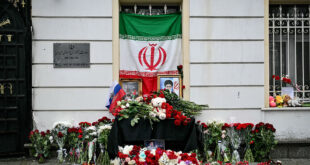BEIRUT — It has become all too familiar in Lebanon. An anti-Syrian politician or journalist is killed, condemnations pour in from friends and foes alike, the funeral attracts thousands, while officials urge unity.
Yet the longer a UN inquiry into the murder of ex-prime minister Rafiq Hariri drags on, the more every assassination threatens to rekindle sectarian divisions between the mostly Shiite supporters of Damascus and its Christian, Sunni and Druze opponents.
On Monday, Gibran Tueni, a newspaper magnate and staunch critic of Syria’s erstwhile domination of Lebanon, became the third Lebanese to be killed in a car bombing since the truck bombing that killed Hariri and 22 others on Februay 14.
Three others, including Tueni’s uncle the Druze Telecoms Minister Marwan Hamadeh, have barely escaped with their lives.
All of those killed since Hariri have been Christians who helped lead popular protests and lobby international pressure for Syria to withdraw its troops from Lebanon in April.
But while anti-Syrians mourned, many Shiites received the news with indifference.
“We are facing a real state of war, not a traditional or classical war but a war that is being carried out through these assassinations,†said Samir Geagea, leader of the Lebanese forces, a Christian party that was a powerful wartime militia.
“They are waging a war to prevent the establishment of a real state in Lebanon … They are raising the temperature a couple of degrees by a couple of degrees and think we will not notice until the country falls apart,†he told LBC television.
On Monday, the government voted to ask the UN Security Council, which meets within hours to discuss a report that points to Syrian and Lebanese involvement in Hariri’s murder, to expand the investigation to cover all those killings.
It also demanded a trial with an “international character†to try suspects in Hariri’s case, prompting the withdrawal of five Shiite ministers close to Syria who complained that the decision would mean too much Western involvement in Lebanon.
They have suspended their participation in Cabinet and are considering resigning.
“The Shiite ministers’ walkout proves what we have suspected, that their participation has been cosmetic, that the country is divided along one sectarian line,†said Osama Safa, director of the Lebanese Centre for Policy Studies. “I think Hizbollah will wait for this Security Council meeting. If the Security Council slaps sanctions on Syria then the wild card will really be the Hizbollah response.â€
More trouble ahead
Washington considers Hizbollah, a Shiite group whose attacks helped end Israel’s 22-year occupation of southern Lebanon in 2000, a “terrorist group.†Backed by Lebanon’s former power broker, Syria, Hizbollah was the only Lebanese group to keep its weapons after the 1975-1990 civil war but is under increasing pressure to disarm.
The group has found itself at odds with the Security Council, which last year passed a resolution demanding Syria withdraw from Lebanon and all militia disarm, and has resisted increasing international involvement in the country.
Hizbollah says it believes the United States will use pressure on it to corner Syria, long on the US list of state sponsors of terror and which is under increasing pressure to cooperate with the UN investigation that has implicated it in Hariri’s killing.
“It is crucial that Lebanon be as secluded as possible from international and regional conflicts that are turning this into a battle for Lebanon’s custody rather than a struggle to rebuild its state,†said Robert Malley, Middle East and North Africa director for the International Crisis Group.
“Lebanon is already vulnerable to sectarian differences. If it also becomes the arena for regional and international struggles, it might not weather the storm.†If the five Shiite ministers, loyal to Hizbollah and its pro-Syrian ally, Amal, do resign, analysts say the government would be hard pressed to find replacements to represent the Shiites, the largest of Lebanon’s myriad religious sects.
With everyone in Lebanon predicting the attacks will continue, analysts say the wider the gulf becomes the more difficult it will be to bridge, a fear that is never far from the minds of Lebanese and that had been voiced by Tueni himself.
At a March 14 rally to demand the Syrians withdraw from Lebanon, six days after a Hizbollah rally thanking them for their 29-year military involvement, the crowds repeated his vow of unity: “We swear by God Almighty, Muslims and Christians, to remain united and defend great Lebanon forever and ever.â€
 Eurasia Press & News
Eurasia Press & News



